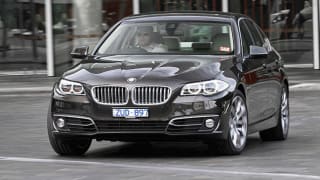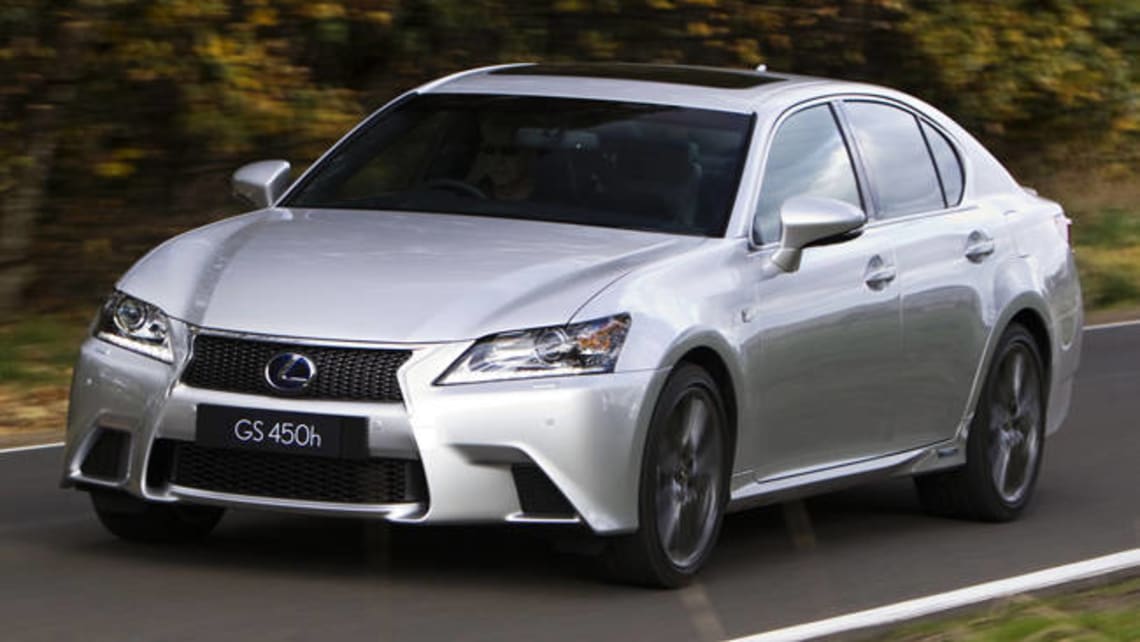
BMW 5 Series 2014 review: road test
Halfway through a seven-year stint as the enviable car bay filler in Australia's corporate garage, BMW raises the bar.
Browse over 9,000 car reviews

Hot on the heels of the release of its fourth-generation petrol-powered GS models, Lexus has added the GS 450h petrol/electric variant to the range.
The big news with the second-generation Lexus GS 450h is a substantial drop in price from $126,800 for the outgoing single-variant model down to $99,990 for the entry-level 2012 model.
In 2006 when the original GS 450h was released we commented on the good value it represented for its class. Now, despite a mid-life price rise, six years of inflation and the addition of considerably more equipment the new model is 20 per cent cheaper so the value equation has jumped even further.

Lexus and parent company Toyota are both keen on promoting their petrol-electric hybrid models and have significantly reduced prices on them.
Lexus has long been the leader in luxury hybrids and it’s interesting to note that both BMW and Mercedes-Benz have competitors on the way in the form of the BMW ActiveHybrid 5 (based on the 5 Series) and the Mercedes-Benz E400 Hybrid (based on the E-Class).
The GS 450h shares the same V6 petrol engine as the GS 350 although with slightly less power (215 kW compared with 233 kW) and torque (352 Nm vs 378 Nm) but modified to have an Atkinson cycle for improved efficiency and lower fuel consumption. When combined with the 650-volt nickel-metal hydride battery peak power increases to 254 kW.
Lexus is planning on eventually replacing the nickel-metal hydride batteries with more efficient lithium-ion units, but could not provide a time frame when this will happen. All GS 450h variants come with six-step continuously variable transmission (CVT), unlike the GS 250 and GS 350 which get six-speed sequential automatic.
For the first time, the GS 450h hybrid model comes with the same three equipment levels that are available in the two petrol models. These are Luxury, F Sport and Sports Luxury. Previously only one variant was offered.
Standard equipment in the entry-level GS 450h Luxury includes ten airbags, a so-called blind spot monitor in the door mirrors, parking sensors, reversing camera, moonroof, LED daytime running lights, Bluetooth telephone and audio streaming, dual-zone climate control air conditioning, 8-inch multimedia monitor and head-up display.
The flagship GS 450h Sport Luxury tops up the Luxury’s features with a 12.3-inch multimedia monitor, driver fatigue monitor, enhanced Mark Levinson audio, three-zone climate control, automatic high/low beam headlights, and leather and woodgrain trim.
The official combined cycle fuel consumption figure for the Lexus GS 450h is 6.3 litres per 100 kilometres, compared with 9.3 L/100km and 9.7 L/100km respectively from the GS 250 and GS 350. Likewise combined cycle CO2 emissions are 147 g/km compared to 215 and 225.
Styling of the new GS 450h is much the same as that of the GS 250 and GS 350 models released in early April 2012. The most notable change from the previous GS series is the bold grille styling of the type that’s all the rage at the moment. Lexus calls it’s a ‘spindle-grille’ because of the bobbin-like pinched in section at the top. The design is attractive and distinctive.
The Lexus GS 450h F Sport adds body kit, 19-inch alloy wheels, sports suspension settings, dynamic handling system and all-speed active cruise control.
One feature of the outgoing GS 450h that drew justified criticism was the limited size of the boot caused by the location of the batteries behind the rear seat. Lexus has addressed the problem in the 2012 model by stacking the batteries in two rows with the battery devices laid on top. The new arrangement increases boot capacity by 45 per cent to a reasonable 465 litres, only 75 litres less than the GS 250/350.
One of the barriers to the sale of any new-technology commodity is the price premium that early-adopters have to pay. However with the release of the second-generation GS hybrid, Lexus CEO Tony Cramb says, “the hybrid price premium has all-but been eliminated” by a combination of price decreases and additional equipment which cuts into the $10,000-$12,000 extra cost of the GS 450h over the GS 350
We commented in the course of our recent review of the 2012 petrol GS models that the car had made the step up from being a commuter to become a true grand tourer able to match the comfort, smoothness and quietness of the big-name German marquees that have been Lexus’s target from day one.
Following our extended drive of the GS 450h to the north of Melbourne we can only re-affirm that view and add that the GS 450h provides the added benefit of significantly lower fuel consumption and emissions.
With significant price drops across the Lexus GS range we can see many prospective buyers stepping into one or other of the hybrid variants instead of their petrol-only siblings. There’s no loss in comfort or performance but significant gains in fuel economy and emissions.
| Vehicle | Specs | Price* | |
|---|---|---|---|
| GS450H Hybrid | 3.5L, Hyb/PULP, CVT AUTO | $17,050 – 21,890 | 2012 Lexus GS 2012 GS450H Hybrid Pricing and Specs |
| GS460 Sport Luxury | 4.6L, PULP, 8 SP SEQ AUTO | $22,990 – 28,380 | 2012 Lexus GS 2012 GS460 Sport Luxury Pricing and Specs |
| GS300 Sport | 3.0L, PULP, 6 SP SEQ AUTO | $14,960 – 19,690 | 2012 Lexus GS 2012 GS300 Sport Pricing and Specs |
| GS350 Luxury | 3.5L, PULP, 6 SP AUTO | $16,500 – 21,120 | 2012 Lexus GS 2012 GS350 Luxury Pricing and Specs |
$20,020
Lowest price, based on third party pricing data